Research Report: Alcohol Abuse and Indigenous Women's Mental Health
VerifiedAdded on 2023/06/10
|12
|3273
|420
Report
AI Summary
This research report undertakes a systematic review of primary research, focusing on the impact of alcohol abuse on the mental health of indigenous women. The study utilizes the PICO(T) framework to formulate a clinical research question and analyzes the findings of relevant articles, including an evaluation of research design, process, ethics, and findings. The report explores the research topic, emphasizing the relationship between alcohol abuse and mental health issues, and provides a literature review, citing various studies and their implications for nursing practice. Recommendations for future research are offered, alongside a conclusion summarizing the key findings and an annotated bibliography of the cited sources. The paper highlights the need for further investigation into the effects of alcohol abuse on this specific population and suggests the use of both qualitative and quantitative research methodologies.
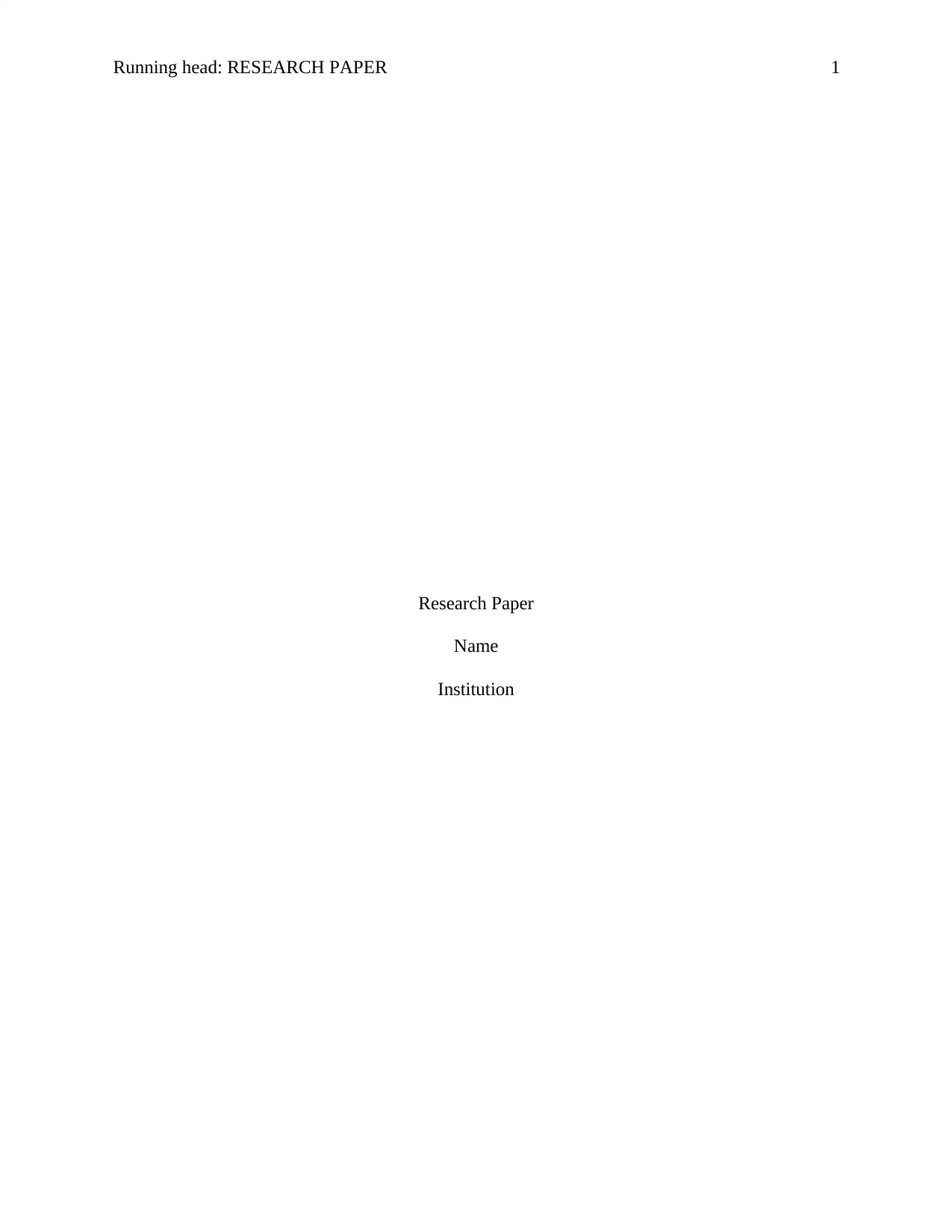
Running head: RESEARCH PAPER 1
Research Paper
Name
Institution
Research Paper
Name
Institution
Paraphrase This Document
Need a fresh take? Get an instant paraphrase of this document with our AI Paraphraser
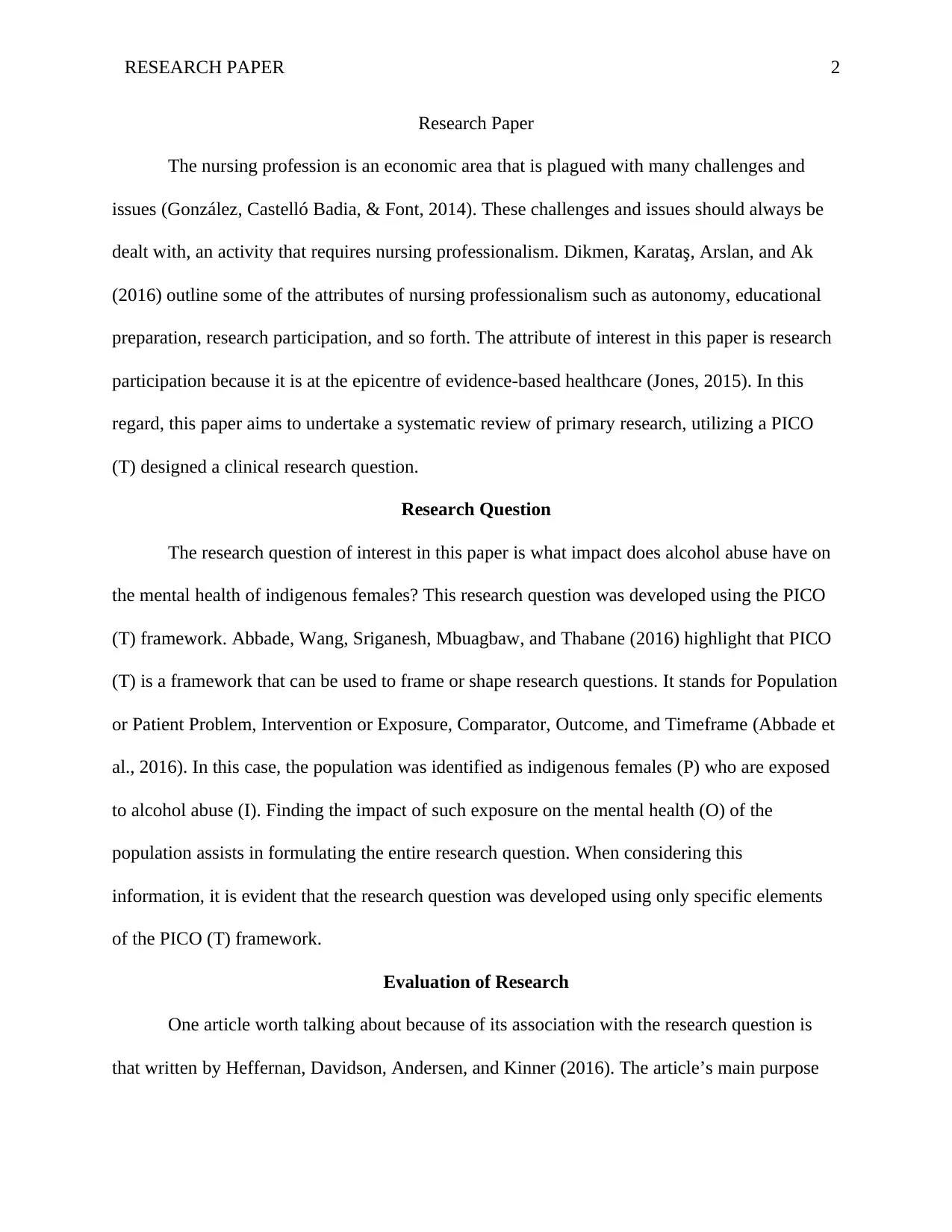
RESEARCH PAPER 2
Research Paper
The nursing profession is an economic area that is plagued with many challenges and
issues (González, Castelló Badia, & Font, 2014). These challenges and issues should always be
dealt with, an activity that requires nursing professionalism. Dikmen, Karataş, Arslan, and Ak
(2016) outline some of the attributes of nursing professionalism such as autonomy, educational
preparation, research participation, and so forth. The attribute of interest in this paper is research
participation because it is at the epicentre of evidence-based healthcare (Jones, 2015). In this
regard, this paper aims to undertake a systematic review of primary research, utilizing a PICO
(T) designed a clinical research question.
Research Question
The research question of interest in this paper is what impact does alcohol abuse have on
the mental health of indigenous females? This research question was developed using the PICO
(T) framework. Abbade, Wang, Sriganesh, Mbuagbaw, and Thabane (2016) highlight that PICO
(T) is a framework that can be used to frame or shape research questions. It stands for Population
or Patient Problem, Intervention or Exposure, Comparator, Outcome, and Timeframe (Abbade et
al., 2016). In this case, the population was identified as indigenous females (P) who are exposed
to alcohol abuse (I). Finding the impact of such exposure on the mental health (O) of the
population assists in formulating the entire research question. When considering this
information, it is evident that the research question was developed using only specific elements
of the PICO (T) framework.
Evaluation of Research
One article worth talking about because of its association with the research question is
that written by Heffernan, Davidson, Andersen, and Kinner (2016). The article’s main purpose
Research Paper
The nursing profession is an economic area that is plagued with many challenges and
issues (González, Castelló Badia, & Font, 2014). These challenges and issues should always be
dealt with, an activity that requires nursing professionalism. Dikmen, Karataş, Arslan, and Ak
(2016) outline some of the attributes of nursing professionalism such as autonomy, educational
preparation, research participation, and so forth. The attribute of interest in this paper is research
participation because it is at the epicentre of evidence-based healthcare (Jones, 2015). In this
regard, this paper aims to undertake a systematic review of primary research, utilizing a PICO
(T) designed a clinical research question.
Research Question
The research question of interest in this paper is what impact does alcohol abuse have on
the mental health of indigenous females? This research question was developed using the PICO
(T) framework. Abbade, Wang, Sriganesh, Mbuagbaw, and Thabane (2016) highlight that PICO
(T) is a framework that can be used to frame or shape research questions. It stands for Population
or Patient Problem, Intervention or Exposure, Comparator, Outcome, and Timeframe (Abbade et
al., 2016). In this case, the population was identified as indigenous females (P) who are exposed
to alcohol abuse (I). Finding the impact of such exposure on the mental health (O) of the
population assists in formulating the entire research question. When considering this
information, it is evident that the research question was developed using only specific elements
of the PICO (T) framework.
Evaluation of Research
One article worth talking about because of its association with the research question is
that written by Heffernan, Davidson, Andersen, and Kinner (2016). The article’s main purpose
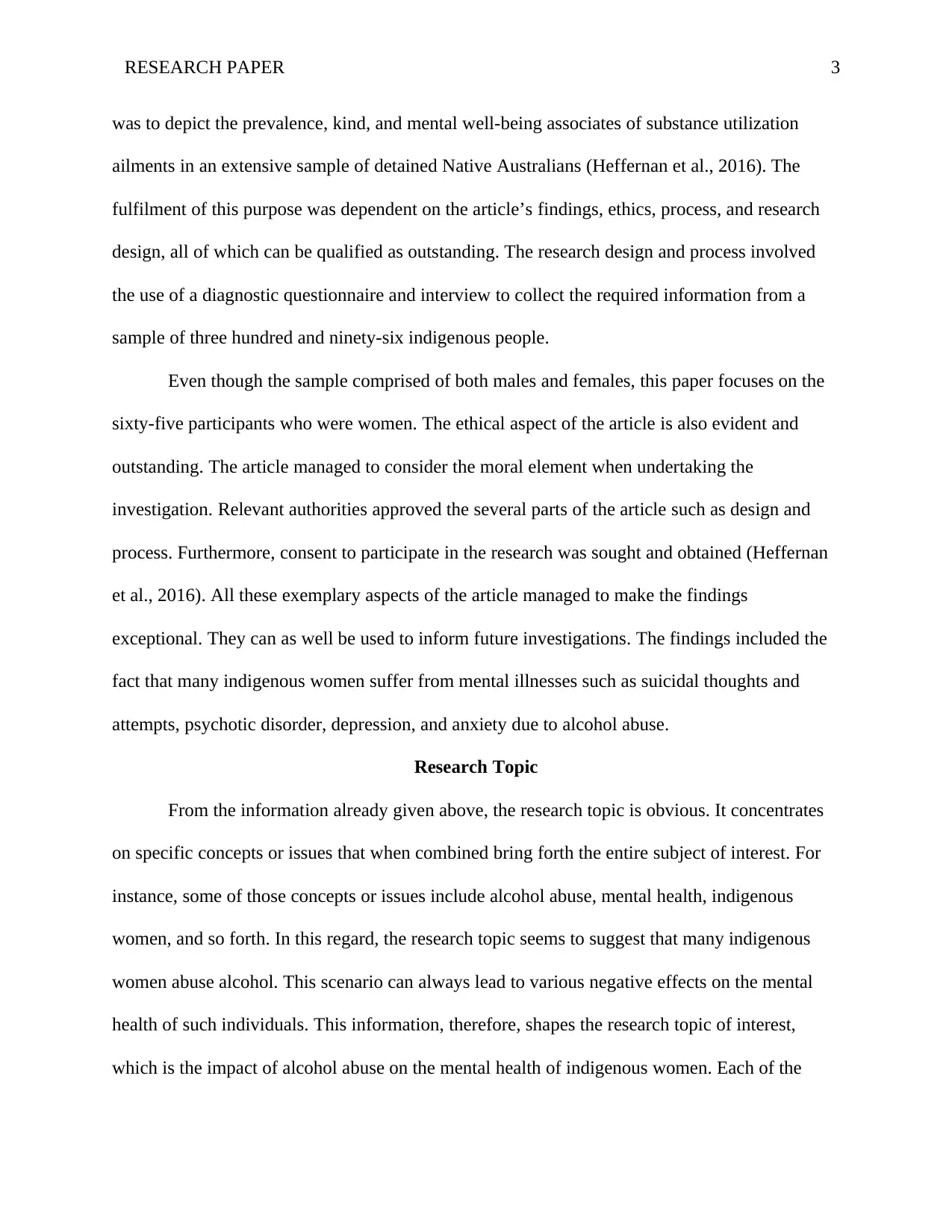
RESEARCH PAPER 3
was to depict the prevalence, kind, and mental well-being associates of substance utilization
ailments in an extensive sample of detained Native Australians (Heffernan et al., 2016). The
fulfilment of this purpose was dependent on the article’s findings, ethics, process, and research
design, all of which can be qualified as outstanding. The research design and process involved
the use of a diagnostic questionnaire and interview to collect the required information from a
sample of three hundred and ninety-six indigenous people.
Even though the sample comprised of both males and females, this paper focuses on the
sixty-five participants who were women. The ethical aspect of the article is also evident and
outstanding. The article managed to consider the moral element when undertaking the
investigation. Relevant authorities approved the several parts of the article such as design and
process. Furthermore, consent to participate in the research was sought and obtained (Heffernan
et al., 2016). All these exemplary aspects of the article managed to make the findings
exceptional. They can as well be used to inform future investigations. The findings included the
fact that many indigenous women suffer from mental illnesses such as suicidal thoughts and
attempts, psychotic disorder, depression, and anxiety due to alcohol abuse.
Research Topic
From the information already given above, the research topic is obvious. It concentrates
on specific concepts or issues that when combined bring forth the entire subject of interest. For
instance, some of those concepts or issues include alcohol abuse, mental health, indigenous
women, and so forth. In this regard, the research topic seems to suggest that many indigenous
women abuse alcohol. This scenario can always lead to various negative effects on the mental
health of such individuals. This information, therefore, shapes the research topic of interest,
which is the impact of alcohol abuse on the mental health of indigenous women. Each of the
was to depict the prevalence, kind, and mental well-being associates of substance utilization
ailments in an extensive sample of detained Native Australians (Heffernan et al., 2016). The
fulfilment of this purpose was dependent on the article’s findings, ethics, process, and research
design, all of which can be qualified as outstanding. The research design and process involved
the use of a diagnostic questionnaire and interview to collect the required information from a
sample of three hundred and ninety-six indigenous people.
Even though the sample comprised of both males and females, this paper focuses on the
sixty-five participants who were women. The ethical aspect of the article is also evident and
outstanding. The article managed to consider the moral element when undertaking the
investigation. Relevant authorities approved the several parts of the article such as design and
process. Furthermore, consent to participate in the research was sought and obtained (Heffernan
et al., 2016). All these exemplary aspects of the article managed to make the findings
exceptional. They can as well be used to inform future investigations. The findings included the
fact that many indigenous women suffer from mental illnesses such as suicidal thoughts and
attempts, psychotic disorder, depression, and anxiety due to alcohol abuse.
Research Topic
From the information already given above, the research topic is obvious. It concentrates
on specific concepts or issues that when combined bring forth the entire subject of interest. For
instance, some of those concepts or issues include alcohol abuse, mental health, indigenous
women, and so forth. In this regard, the research topic seems to suggest that many indigenous
women abuse alcohol. This scenario can always lead to various negative effects on the mental
health of such individuals. This information, therefore, shapes the research topic of interest,
which is the impact of alcohol abuse on the mental health of indigenous women. Each of the
⊘ This is a preview!⊘
Do you want full access?
Subscribe today to unlock all pages.

Trusted by 1+ million students worldwide
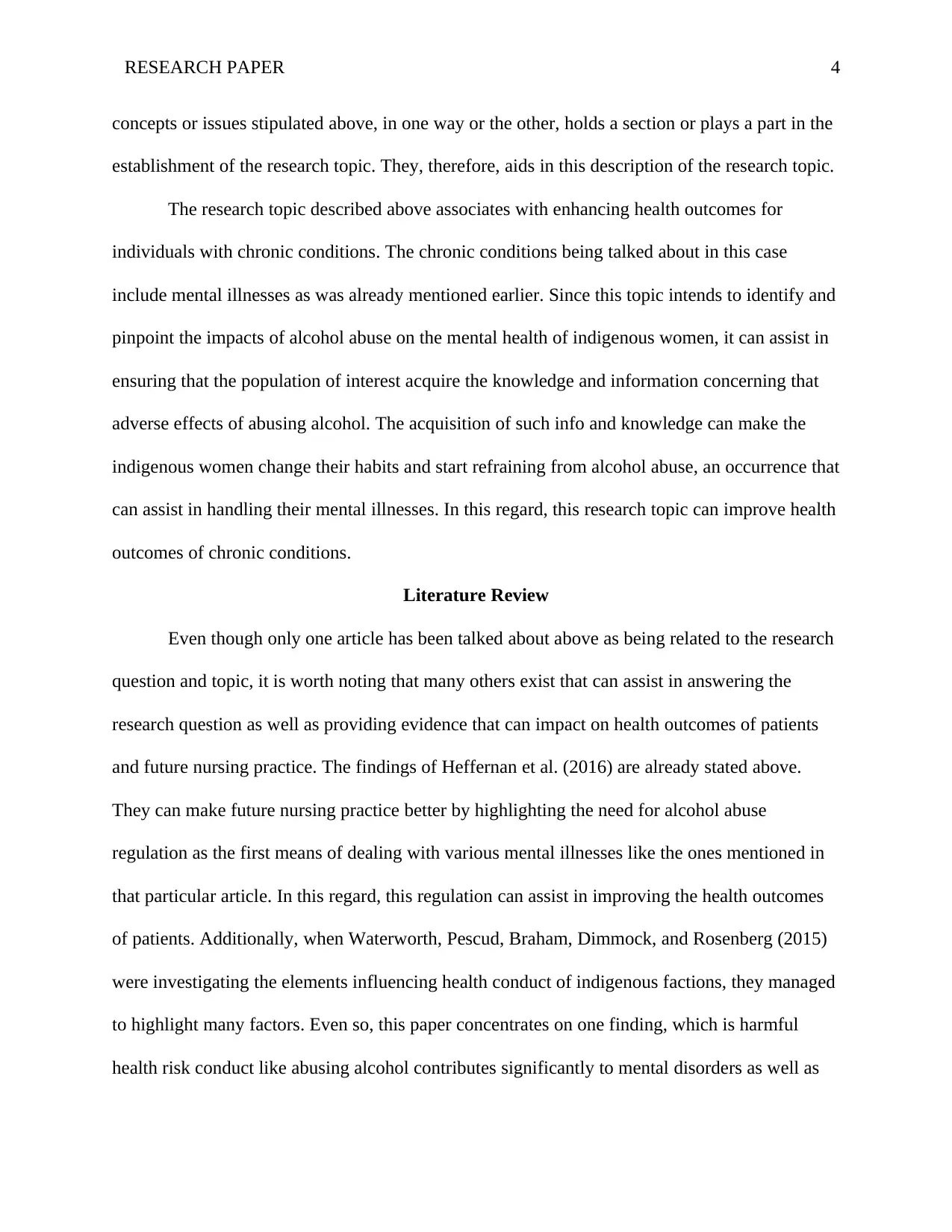
RESEARCH PAPER 4
concepts or issues stipulated above, in one way or the other, holds a section or plays a part in the
establishment of the research topic. They, therefore, aids in this description of the research topic.
The research topic described above associates with enhancing health outcomes for
individuals with chronic conditions. The chronic conditions being talked about in this case
include mental illnesses as was already mentioned earlier. Since this topic intends to identify and
pinpoint the impacts of alcohol abuse on the mental health of indigenous women, it can assist in
ensuring that the population of interest acquire the knowledge and information concerning that
adverse effects of abusing alcohol. The acquisition of such info and knowledge can make the
indigenous women change their habits and start refraining from alcohol abuse, an occurrence that
can assist in handling their mental illnesses. In this regard, this research topic can improve health
outcomes of chronic conditions.
Literature Review
Even though only one article has been talked about above as being related to the research
question and topic, it is worth noting that many others exist that can assist in answering the
research question as well as providing evidence that can impact on health outcomes of patients
and future nursing practice. The findings of Heffernan et al. (2016) are already stated above.
They can make future nursing practice better by highlighting the need for alcohol abuse
regulation as the first means of dealing with various mental illnesses like the ones mentioned in
that particular article. In this regard, this regulation can assist in improving the health outcomes
of patients. Additionally, when Waterworth, Pescud, Braham, Dimmock, and Rosenberg (2015)
were investigating the elements influencing health conduct of indigenous factions, they managed
to highlight many factors. Even so, this paper concentrates on one finding, which is harmful
health risk conduct like abusing alcohol contributes significantly to mental disorders as well as
concepts or issues stipulated above, in one way or the other, holds a section or plays a part in the
establishment of the research topic. They, therefore, aids in this description of the research topic.
The research topic described above associates with enhancing health outcomes for
individuals with chronic conditions. The chronic conditions being talked about in this case
include mental illnesses as was already mentioned earlier. Since this topic intends to identify and
pinpoint the impacts of alcohol abuse on the mental health of indigenous women, it can assist in
ensuring that the population of interest acquire the knowledge and information concerning that
adverse effects of abusing alcohol. The acquisition of such info and knowledge can make the
indigenous women change their habits and start refraining from alcohol abuse, an occurrence that
can assist in handling their mental illnesses. In this regard, this research topic can improve health
outcomes of chronic conditions.
Literature Review
Even though only one article has been talked about above as being related to the research
question and topic, it is worth noting that many others exist that can assist in answering the
research question as well as providing evidence that can impact on health outcomes of patients
and future nursing practice. The findings of Heffernan et al. (2016) are already stated above.
They can make future nursing practice better by highlighting the need for alcohol abuse
regulation as the first means of dealing with various mental illnesses like the ones mentioned in
that particular article. In this regard, this regulation can assist in improving the health outcomes
of patients. Additionally, when Waterworth, Pescud, Braham, Dimmock, and Rosenberg (2015)
were investigating the elements influencing health conduct of indigenous factions, they managed
to highlight many factors. Even so, this paper concentrates on one finding, which is harmful
health risk conduct like abusing alcohol contributes significantly to mental disorders as well as
Paraphrase This Document
Need a fresh take? Get an instant paraphrase of this document with our AI Paraphraser
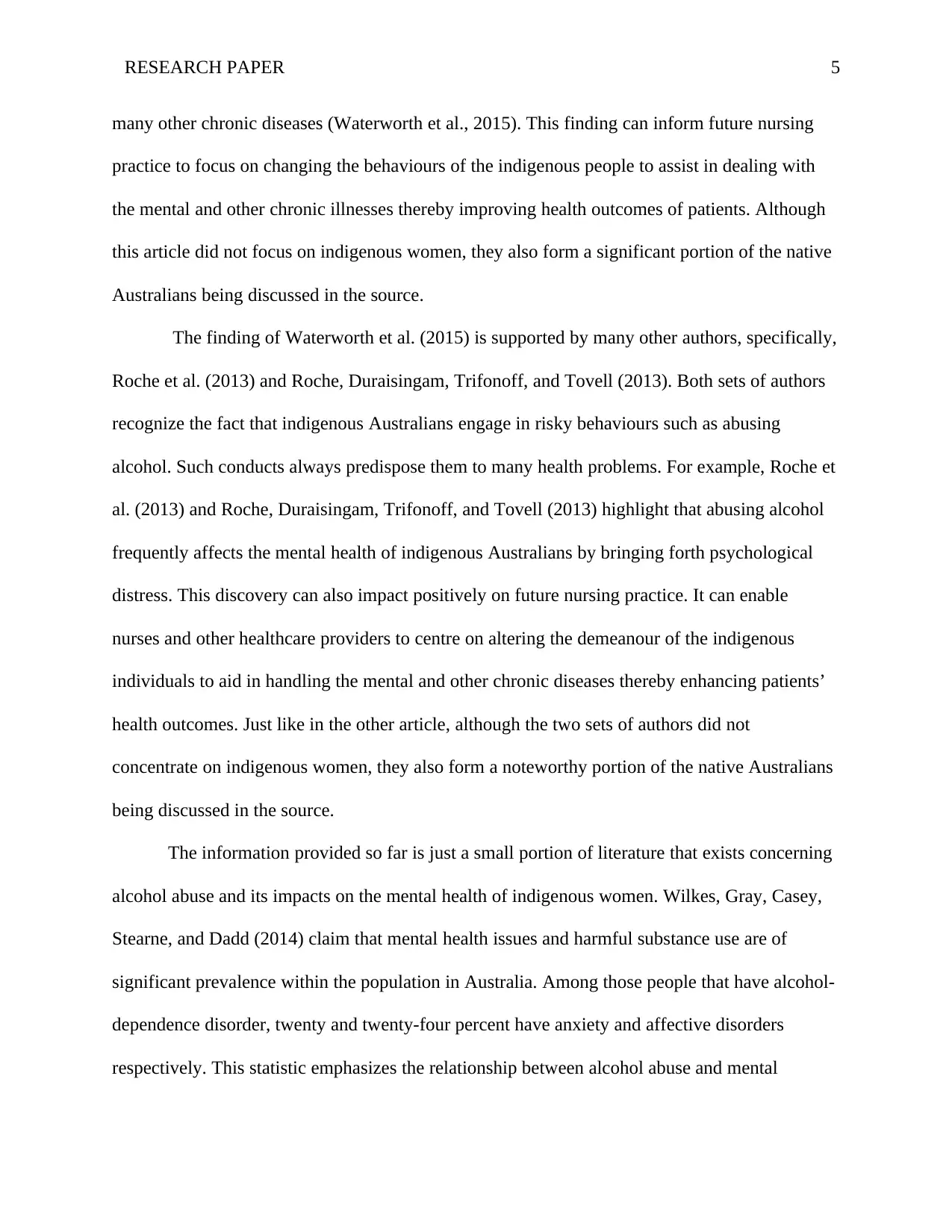
RESEARCH PAPER 5
many other chronic diseases (Waterworth et al., 2015). This finding can inform future nursing
practice to focus on changing the behaviours of the indigenous people to assist in dealing with
the mental and other chronic illnesses thereby improving health outcomes of patients. Although
this article did not focus on indigenous women, they also form a significant portion of the native
Australians being discussed in the source.
The finding of Waterworth et al. (2015) is supported by many other authors, specifically,
Roche et al. (2013) and Roche, Duraisingam, Trifonoff, and Tovell (2013). Both sets of authors
recognize the fact that indigenous Australians engage in risky behaviours such as abusing
alcohol. Such conducts always predispose them to many health problems. For example, Roche et
al. (2013) and Roche, Duraisingam, Trifonoff, and Tovell (2013) highlight that abusing alcohol
frequently affects the mental health of indigenous Australians by bringing forth psychological
distress. This discovery can also impact positively on future nursing practice. It can enable
nurses and other healthcare providers to centre on altering the demeanour of the indigenous
individuals to aid in handling the mental and other chronic diseases thereby enhancing patients’
health outcomes. Just like in the other article, although the two sets of authors did not
concentrate on indigenous women, they also form a noteworthy portion of the native Australians
being discussed in the source.
The information provided so far is just a small portion of literature that exists concerning
alcohol abuse and its impacts on the mental health of indigenous women. Wilkes, Gray, Casey,
Stearne, and Dadd (2014) claim that mental health issues and harmful substance use are of
significant prevalence within the population in Australia. Among those people that have alcohol-
dependence disorder, twenty and twenty-four percent have anxiety and affective disorders
respectively. This statistic emphasizes the relationship between alcohol abuse and mental
many other chronic diseases (Waterworth et al., 2015). This finding can inform future nursing
practice to focus on changing the behaviours of the indigenous people to assist in dealing with
the mental and other chronic illnesses thereby improving health outcomes of patients. Although
this article did not focus on indigenous women, they also form a significant portion of the native
Australians being discussed in the source.
The finding of Waterworth et al. (2015) is supported by many other authors, specifically,
Roche et al. (2013) and Roche, Duraisingam, Trifonoff, and Tovell (2013). Both sets of authors
recognize the fact that indigenous Australians engage in risky behaviours such as abusing
alcohol. Such conducts always predispose them to many health problems. For example, Roche et
al. (2013) and Roche, Duraisingam, Trifonoff, and Tovell (2013) highlight that abusing alcohol
frequently affects the mental health of indigenous Australians by bringing forth psychological
distress. This discovery can also impact positively on future nursing practice. It can enable
nurses and other healthcare providers to centre on altering the demeanour of the indigenous
individuals to aid in handling the mental and other chronic diseases thereby enhancing patients’
health outcomes. Just like in the other article, although the two sets of authors did not
concentrate on indigenous women, they also form a noteworthy portion of the native Australians
being discussed in the source.
The information provided so far is just a small portion of literature that exists concerning
alcohol abuse and its impacts on the mental health of indigenous women. Wilkes, Gray, Casey,
Stearne, and Dadd (2014) claim that mental health issues and harmful substance use are of
significant prevalence within the population in Australia. Among those people that have alcohol-
dependence disorder, twenty and twenty-four percent have anxiety and affective disorders
respectively. This statistic emphasizes the relationship between alcohol abuse and mental
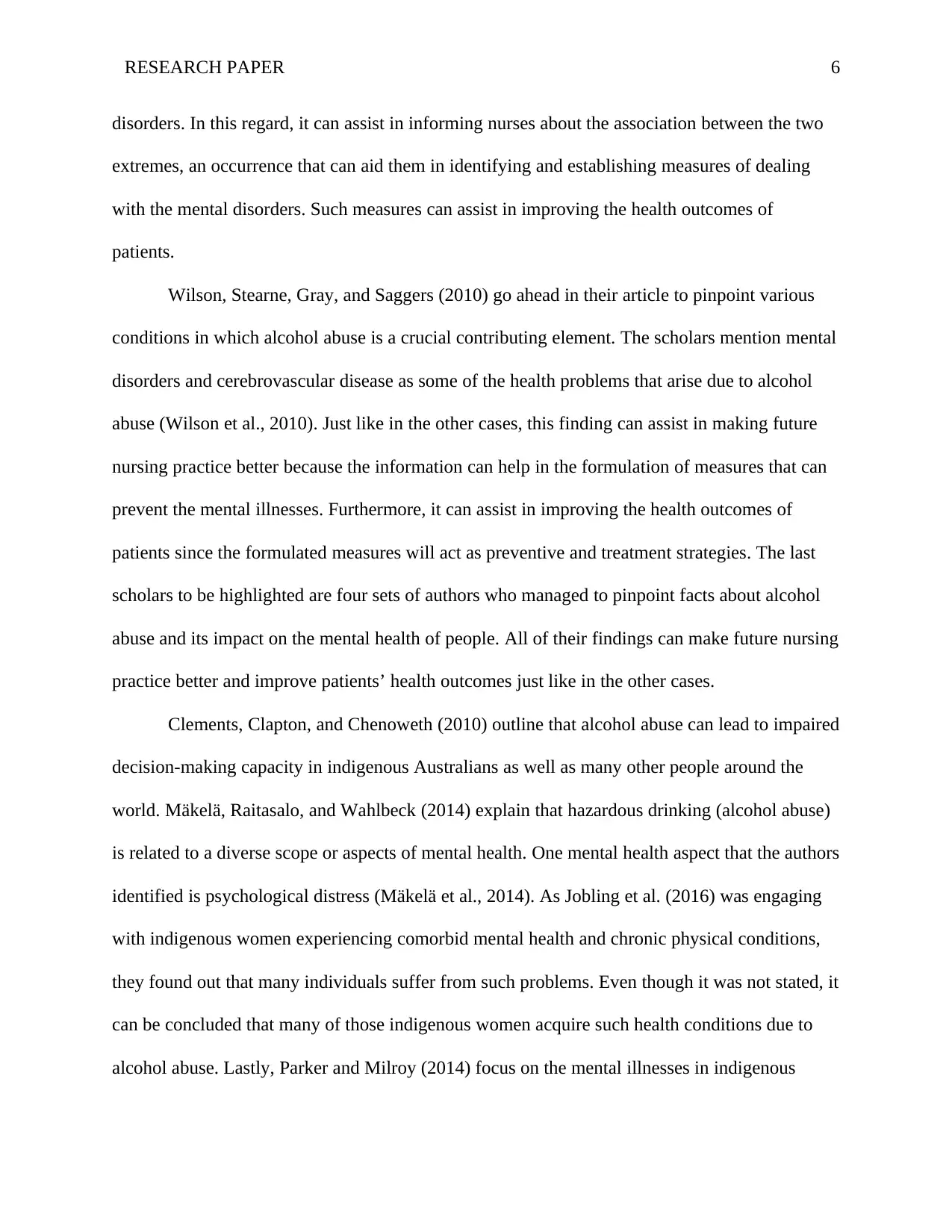
RESEARCH PAPER 6
disorders. In this regard, it can assist in informing nurses about the association between the two
extremes, an occurrence that can aid them in identifying and establishing measures of dealing
with the mental disorders. Such measures can assist in improving the health outcomes of
patients.
Wilson, Stearne, Gray, and Saggers (2010) go ahead in their article to pinpoint various
conditions in which alcohol abuse is a crucial contributing element. The scholars mention mental
disorders and cerebrovascular disease as some of the health problems that arise due to alcohol
abuse (Wilson et al., 2010). Just like in the other cases, this finding can assist in making future
nursing practice better because the information can help in the formulation of measures that can
prevent the mental illnesses. Furthermore, it can assist in improving the health outcomes of
patients since the formulated measures will act as preventive and treatment strategies. The last
scholars to be highlighted are four sets of authors who managed to pinpoint facts about alcohol
abuse and its impact on the mental health of people. All of their findings can make future nursing
practice better and improve patients’ health outcomes just like in the other cases.
Clements, Clapton, and Chenoweth (2010) outline that alcohol abuse can lead to impaired
decision-making capacity in indigenous Australians as well as many other people around the
world. Mäkelä, Raitasalo, and Wahlbeck (2014) explain that hazardous drinking (alcohol abuse)
is related to a diverse scope or aspects of mental health. One mental health aspect that the authors
identified is psychological distress (Mäkelä et al., 2014). As Jobling et al. (2016) was engaging
with indigenous women experiencing comorbid mental health and chronic physical conditions,
they found out that many individuals suffer from such problems. Even though it was not stated, it
can be concluded that many of those indigenous women acquire such health conditions due to
alcohol abuse. Lastly, Parker and Milroy (2014) focus on the mental illnesses in indigenous
disorders. In this regard, it can assist in informing nurses about the association between the two
extremes, an occurrence that can aid them in identifying and establishing measures of dealing
with the mental disorders. Such measures can assist in improving the health outcomes of
patients.
Wilson, Stearne, Gray, and Saggers (2010) go ahead in their article to pinpoint various
conditions in which alcohol abuse is a crucial contributing element. The scholars mention mental
disorders and cerebrovascular disease as some of the health problems that arise due to alcohol
abuse (Wilson et al., 2010). Just like in the other cases, this finding can assist in making future
nursing practice better because the information can help in the formulation of measures that can
prevent the mental illnesses. Furthermore, it can assist in improving the health outcomes of
patients since the formulated measures will act as preventive and treatment strategies. The last
scholars to be highlighted are four sets of authors who managed to pinpoint facts about alcohol
abuse and its impact on the mental health of people. All of their findings can make future nursing
practice better and improve patients’ health outcomes just like in the other cases.
Clements, Clapton, and Chenoweth (2010) outline that alcohol abuse can lead to impaired
decision-making capacity in indigenous Australians as well as many other people around the
world. Mäkelä, Raitasalo, and Wahlbeck (2014) explain that hazardous drinking (alcohol abuse)
is related to a diverse scope or aspects of mental health. One mental health aspect that the authors
identified is psychological distress (Mäkelä et al., 2014). As Jobling et al. (2016) was engaging
with indigenous women experiencing comorbid mental health and chronic physical conditions,
they found out that many individuals suffer from such problems. Even though it was not stated, it
can be concluded that many of those indigenous women acquire such health conditions due to
alcohol abuse. Lastly, Parker and Milroy (2014) focus on the mental illnesses in indigenous
⊘ This is a preview!⊘
Do you want full access?
Subscribe today to unlock all pages.

Trusted by 1+ million students worldwide
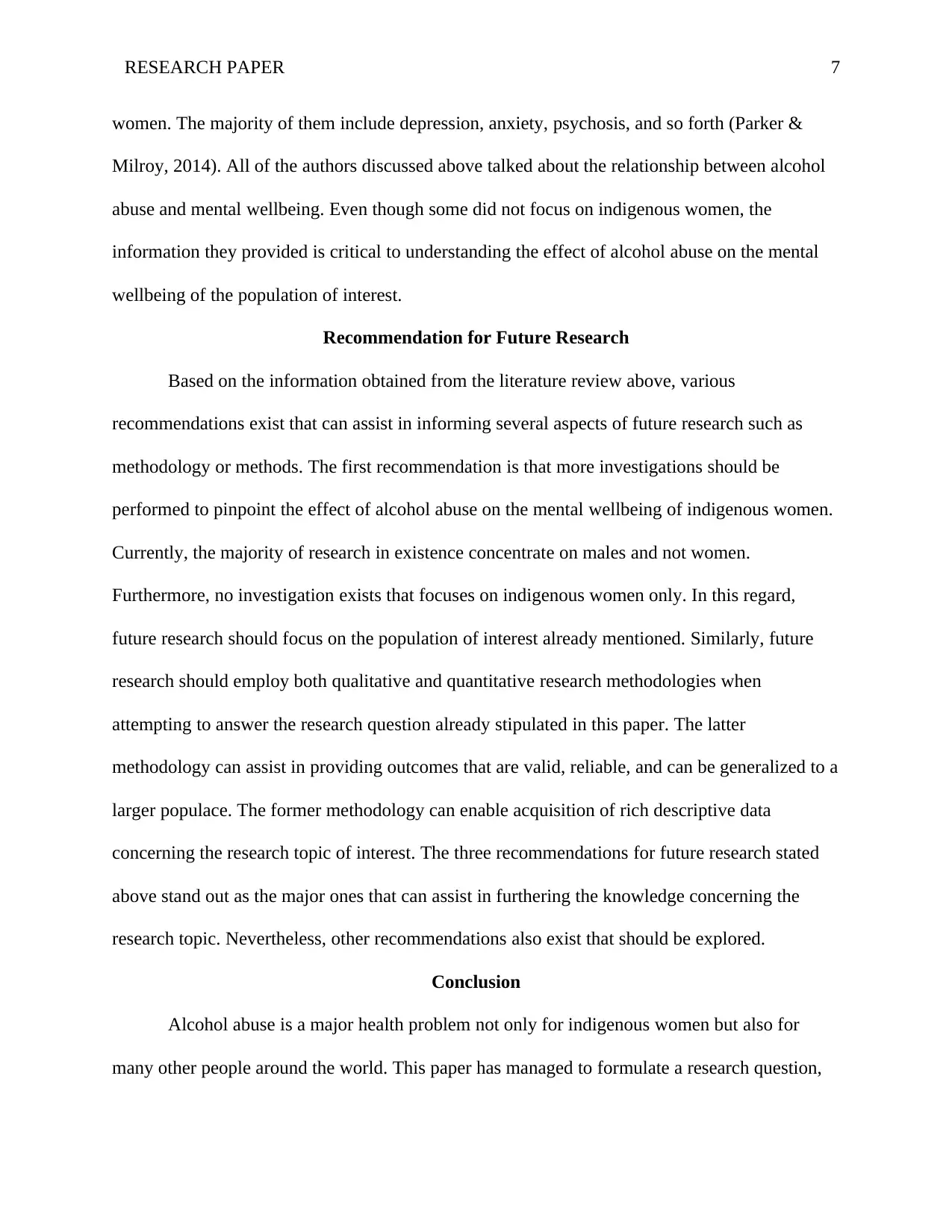
RESEARCH PAPER 7
women. The majority of them include depression, anxiety, psychosis, and so forth (Parker &
Milroy, 2014). All of the authors discussed above talked about the relationship between alcohol
abuse and mental wellbeing. Even though some did not focus on indigenous women, the
information they provided is critical to understanding the effect of alcohol abuse on the mental
wellbeing of the population of interest.
Recommendation for Future Research
Based on the information obtained from the literature review above, various
recommendations exist that can assist in informing several aspects of future research such as
methodology or methods. The first recommendation is that more investigations should be
performed to pinpoint the effect of alcohol abuse on the mental wellbeing of indigenous women.
Currently, the majority of research in existence concentrate on males and not women.
Furthermore, no investigation exists that focuses on indigenous women only. In this regard,
future research should focus on the population of interest already mentioned. Similarly, future
research should employ both qualitative and quantitative research methodologies when
attempting to answer the research question already stipulated in this paper. The latter
methodology can assist in providing outcomes that are valid, reliable, and can be generalized to a
larger populace. The former methodology can enable acquisition of rich descriptive data
concerning the research topic of interest. The three recommendations for future research stated
above stand out as the major ones that can assist in furthering the knowledge concerning the
research topic. Nevertheless, other recommendations also exist that should be explored.
Conclusion
Alcohol abuse is a major health problem not only for indigenous women but also for
many other people around the world. This paper has managed to formulate a research question,
women. The majority of them include depression, anxiety, psychosis, and so forth (Parker &
Milroy, 2014). All of the authors discussed above talked about the relationship between alcohol
abuse and mental wellbeing. Even though some did not focus on indigenous women, the
information they provided is critical to understanding the effect of alcohol abuse on the mental
wellbeing of the population of interest.
Recommendation for Future Research
Based on the information obtained from the literature review above, various
recommendations exist that can assist in informing several aspects of future research such as
methodology or methods. The first recommendation is that more investigations should be
performed to pinpoint the effect of alcohol abuse on the mental wellbeing of indigenous women.
Currently, the majority of research in existence concentrate on males and not women.
Furthermore, no investigation exists that focuses on indigenous women only. In this regard,
future research should focus on the population of interest already mentioned. Similarly, future
research should employ both qualitative and quantitative research methodologies when
attempting to answer the research question already stipulated in this paper. The latter
methodology can assist in providing outcomes that are valid, reliable, and can be generalized to a
larger populace. The former methodology can enable acquisition of rich descriptive data
concerning the research topic of interest. The three recommendations for future research stated
above stand out as the major ones that can assist in furthering the knowledge concerning the
research topic. Nevertheless, other recommendations also exist that should be explored.
Conclusion
Alcohol abuse is a major health problem not only for indigenous women but also for
many other people around the world. This paper has managed to formulate a research question,
Paraphrase This Document
Need a fresh take? Get an instant paraphrase of this document with our AI Paraphraser
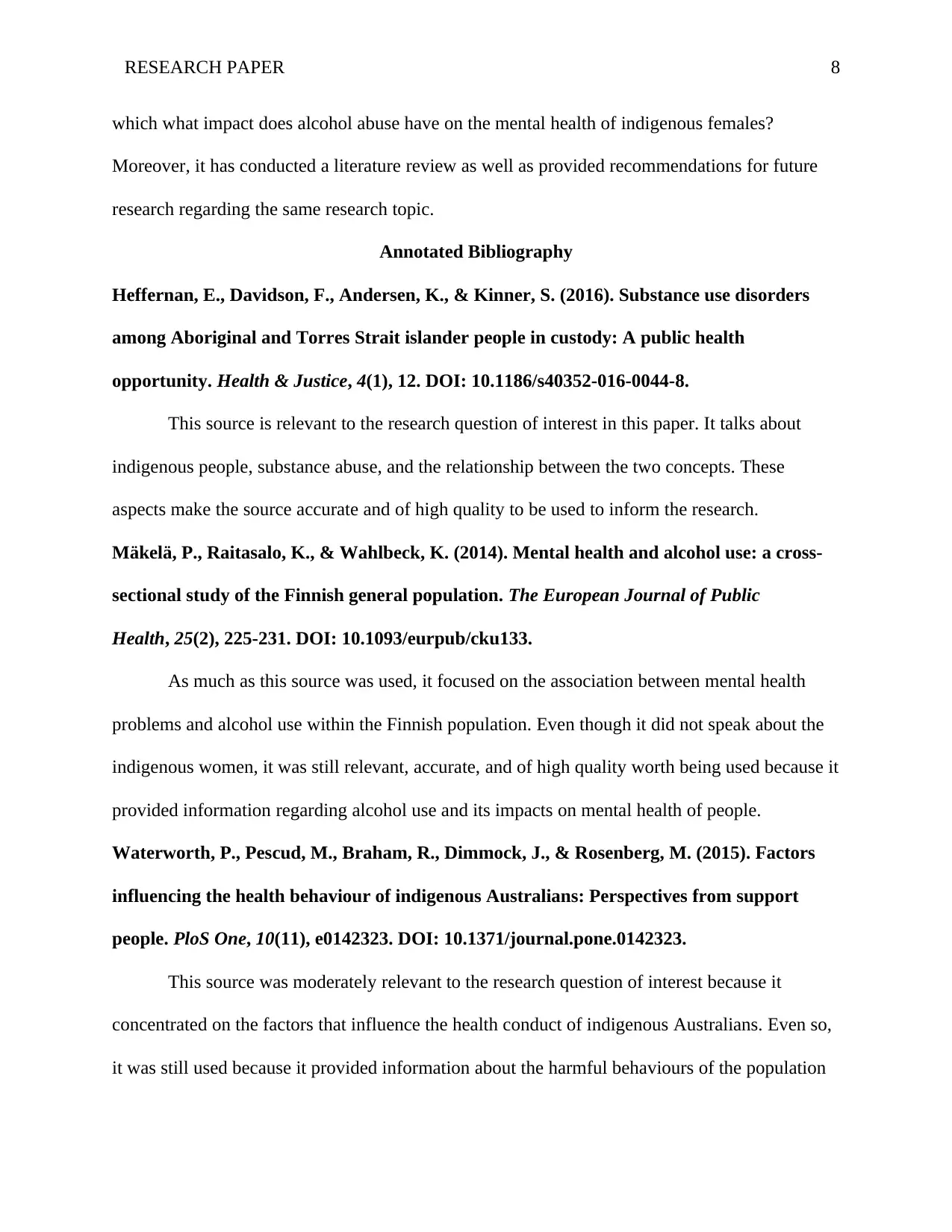
RESEARCH PAPER 8
which what impact does alcohol abuse have on the mental health of indigenous females?
Moreover, it has conducted a literature review as well as provided recommendations for future
research regarding the same research topic.
Annotated Bibliography
Heffernan, E., Davidson, F., Andersen, K., & Kinner, S. (2016). Substance use disorders
among Aboriginal and Torres Strait islander people in custody: A public health
opportunity. Health & Justice, 4(1), 12. DOI: 10.1186/s40352-016-0044-8.
This source is relevant to the research question of interest in this paper. It talks about
indigenous people, substance abuse, and the relationship between the two concepts. These
aspects make the source accurate and of high quality to be used to inform the research.
Mäkelä, P., Raitasalo, K., & Wahlbeck, K. (2014). Mental health and alcohol use: a cross-
sectional study of the Finnish general population. The European Journal of Public
Health, 25(2), 225-231. DOI: 10.1093/eurpub/cku133.
As much as this source was used, it focused on the association between mental health
problems and alcohol use within the Finnish population. Even though it did not speak about the
indigenous women, it was still relevant, accurate, and of high quality worth being used because it
provided information regarding alcohol use and its impacts on mental health of people.
Waterworth, P., Pescud, M., Braham, R., Dimmock, J., & Rosenberg, M. (2015). Factors
influencing the health behaviour of indigenous Australians: Perspectives from support
people. PloS One, 10(11), e0142323. DOI: 10.1371/journal.pone.0142323.
This source was moderately relevant to the research question of interest because it
concentrated on the factors that influence the health conduct of indigenous Australians. Even so,
it was still used because it provided information about the harmful behaviours of the population
which what impact does alcohol abuse have on the mental health of indigenous females?
Moreover, it has conducted a literature review as well as provided recommendations for future
research regarding the same research topic.
Annotated Bibliography
Heffernan, E., Davidson, F., Andersen, K., & Kinner, S. (2016). Substance use disorders
among Aboriginal and Torres Strait islander people in custody: A public health
opportunity. Health & Justice, 4(1), 12. DOI: 10.1186/s40352-016-0044-8.
This source is relevant to the research question of interest in this paper. It talks about
indigenous people, substance abuse, and the relationship between the two concepts. These
aspects make the source accurate and of high quality to be used to inform the research.
Mäkelä, P., Raitasalo, K., & Wahlbeck, K. (2014). Mental health and alcohol use: a cross-
sectional study of the Finnish general population. The European Journal of Public
Health, 25(2), 225-231. DOI: 10.1093/eurpub/cku133.
As much as this source was used, it focused on the association between mental health
problems and alcohol use within the Finnish population. Even though it did not speak about the
indigenous women, it was still relevant, accurate, and of high quality worth being used because it
provided information regarding alcohol use and its impacts on mental health of people.
Waterworth, P., Pescud, M., Braham, R., Dimmock, J., & Rosenberg, M. (2015). Factors
influencing the health behaviour of indigenous Australians: Perspectives from support
people. PloS One, 10(11), e0142323. DOI: 10.1371/journal.pone.0142323.
This source was moderately relevant to the research question of interest because it
concentrated on the factors that influence the health conduct of indigenous Australians. Even so,
it was still used because it provided information about the harmful behaviours of the population
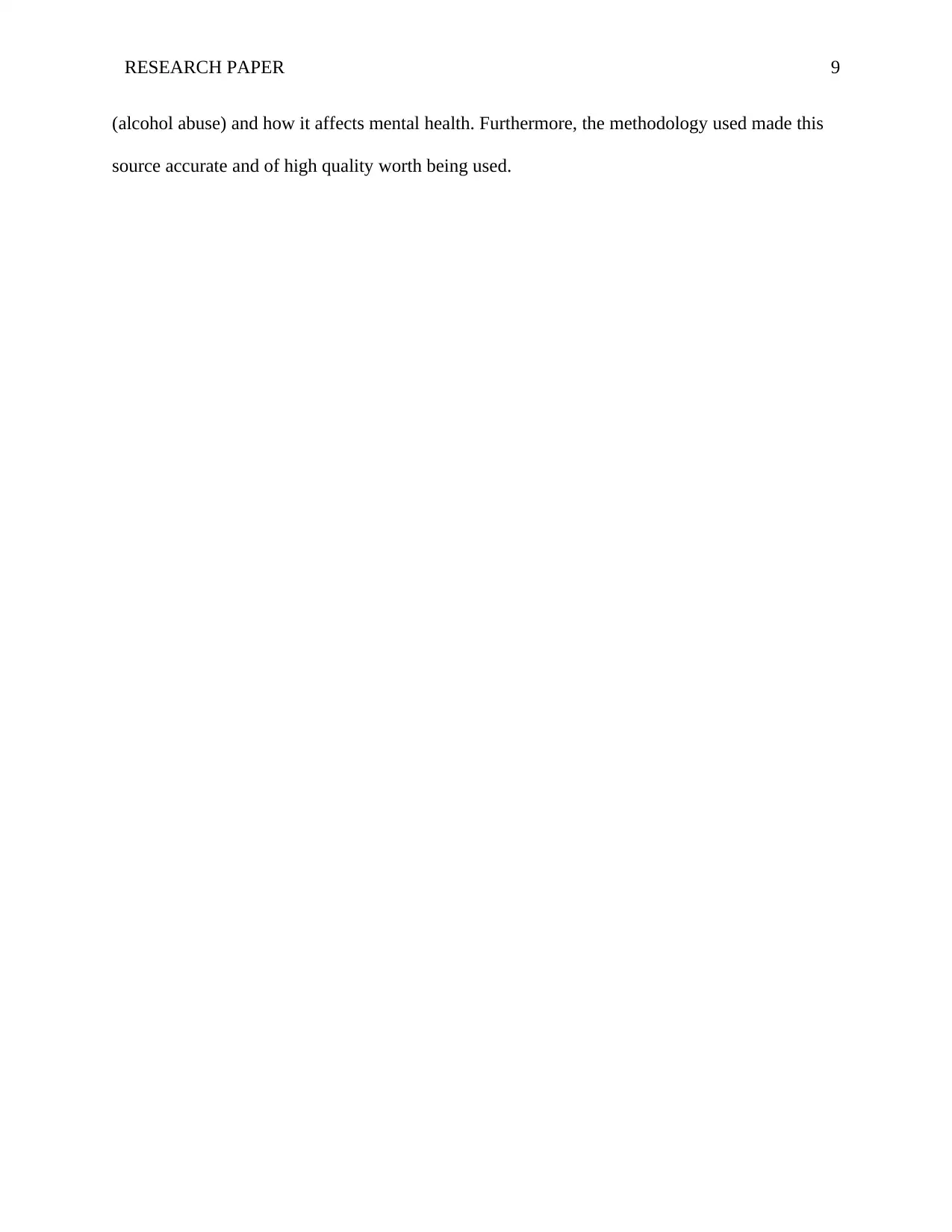
RESEARCH PAPER 9
(alcohol abuse) and how it affects mental health. Furthermore, the methodology used made this
source accurate and of high quality worth being used.
(alcohol abuse) and how it affects mental health. Furthermore, the methodology used made this
source accurate and of high quality worth being used.
⊘ This is a preview!⊘
Do you want full access?
Subscribe today to unlock all pages.

Trusted by 1+ million students worldwide
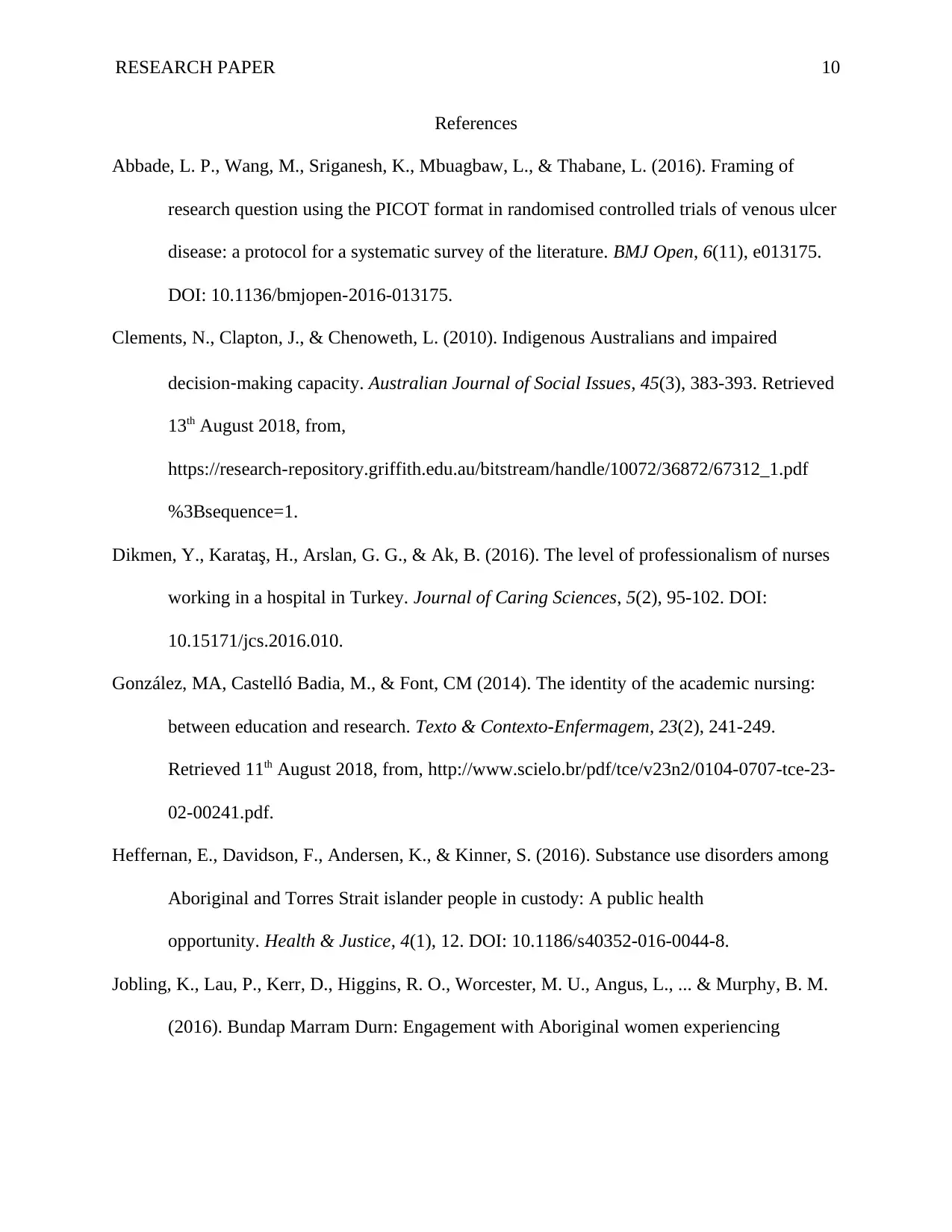
RESEARCH PAPER 10
References
Abbade, L. P., Wang, M., Sriganesh, K., Mbuagbaw, L., & Thabane, L. (2016). Framing of
research question using the PICOT format in randomised controlled trials of venous ulcer
disease: a protocol for a systematic survey of the literature. BMJ Open, 6(11), e013175.
DOI: 10.1136/bmjopen-2016-013175.
Clements, N., Clapton, J., & Chenoweth, L. (2010). Indigenous Australians and impaired
decision‐making capacity. Australian Journal of Social Issues, 45(3), 383-393. Retrieved
13th August 2018, from,
https://research-repository.griffith.edu.au/bitstream/handle/10072/36872/67312_1.pdf
%3Bsequence=1.
Dikmen, Y., Karataş, H., Arslan, G. G., & Ak, B. (2016). The level of professionalism of nurses
working in a hospital in Turkey. Journal of Caring Sciences, 5(2), 95-102. DOI:
10.15171/jcs.2016.010.
González, MA, Castelló Badia, M., & Font, CM (2014). The identity of the academic nursing:
between education and research. Texto & Contexto-Enfermagem, 23(2), 241-249.
Retrieved 11th August 2018, from, http://www.scielo.br/pdf/tce/v23n2/0104-0707-tce-23-
02-00241.pdf.
Heffernan, E., Davidson, F., Andersen, K., & Kinner, S. (2016). Substance use disorders among
Aboriginal and Torres Strait islander people in custody: A public health
opportunity. Health & Justice, 4(1), 12. DOI: 10.1186/s40352-016-0044-8.
Jobling, K., Lau, P., Kerr, D., Higgins, R. O., Worcester, M. U., Angus, L., ... & Murphy, B. M.
(2016). Bundap Marram Durn: Engagement with Aboriginal women experiencing
References
Abbade, L. P., Wang, M., Sriganesh, K., Mbuagbaw, L., & Thabane, L. (2016). Framing of
research question using the PICOT format in randomised controlled trials of venous ulcer
disease: a protocol for a systematic survey of the literature. BMJ Open, 6(11), e013175.
DOI: 10.1136/bmjopen-2016-013175.
Clements, N., Clapton, J., & Chenoweth, L. (2010). Indigenous Australians and impaired
decision‐making capacity. Australian Journal of Social Issues, 45(3), 383-393. Retrieved
13th August 2018, from,
https://research-repository.griffith.edu.au/bitstream/handle/10072/36872/67312_1.pdf
%3Bsequence=1.
Dikmen, Y., Karataş, H., Arslan, G. G., & Ak, B. (2016). The level of professionalism of nurses
working in a hospital in Turkey. Journal of Caring Sciences, 5(2), 95-102. DOI:
10.15171/jcs.2016.010.
González, MA, Castelló Badia, M., & Font, CM (2014). The identity of the academic nursing:
between education and research. Texto & Contexto-Enfermagem, 23(2), 241-249.
Retrieved 11th August 2018, from, http://www.scielo.br/pdf/tce/v23n2/0104-0707-tce-23-
02-00241.pdf.
Heffernan, E., Davidson, F., Andersen, K., & Kinner, S. (2016). Substance use disorders among
Aboriginal and Torres Strait islander people in custody: A public health
opportunity. Health & Justice, 4(1), 12. DOI: 10.1186/s40352-016-0044-8.
Jobling, K., Lau, P., Kerr, D., Higgins, R. O., Worcester, M. U., Angus, L., ... & Murphy, B. M.
(2016). Bundap Marram Durn: Engagement with Aboriginal women experiencing
Paraphrase This Document
Need a fresh take? Get an instant paraphrase of this document with our AI Paraphraser
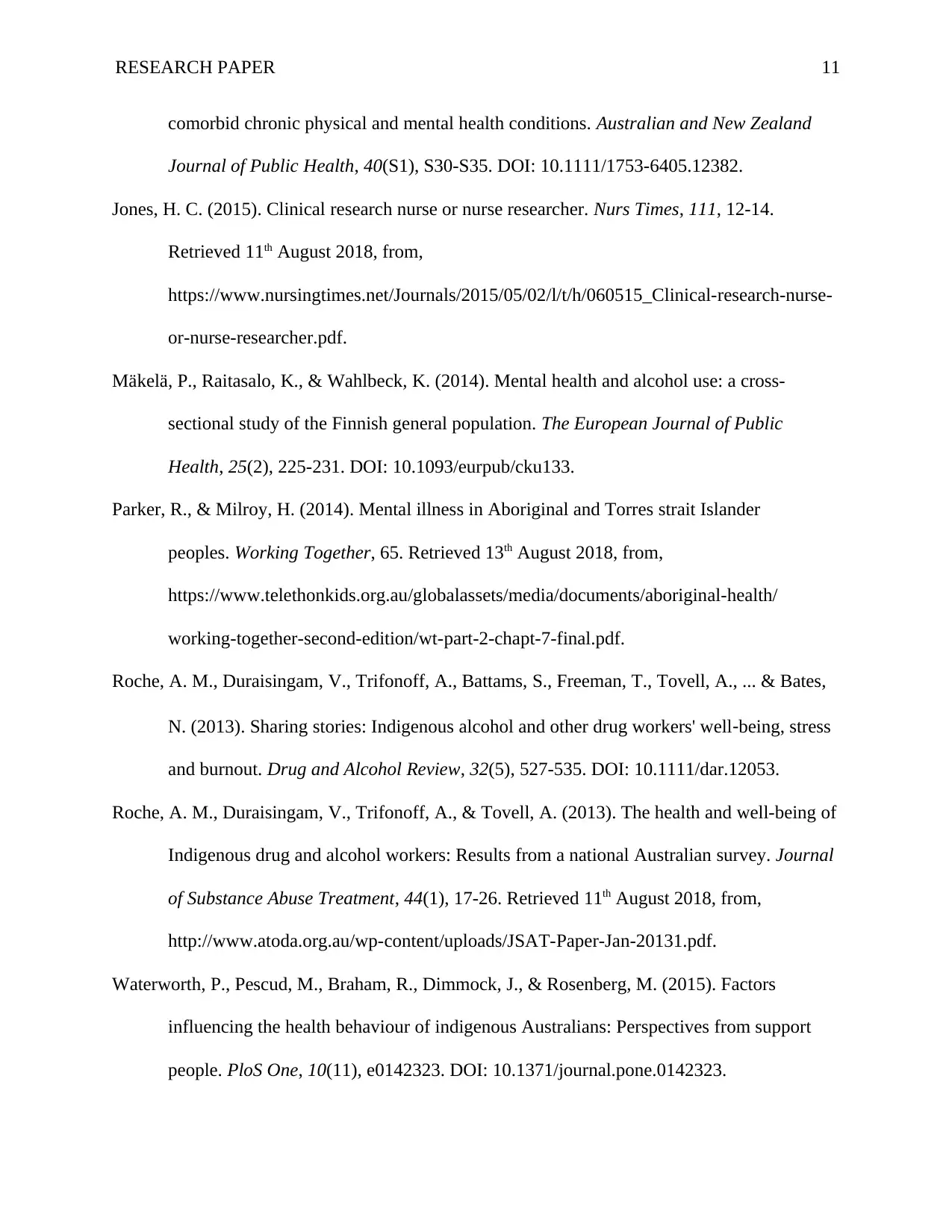
RESEARCH PAPER 11
comorbid chronic physical and mental health conditions. Australian and New Zealand
Journal of Public Health, 40(S1), S30-S35. DOI: 10.1111/1753-6405.12382.
Jones, H. C. (2015). Clinical research nurse or nurse researcher. Nurs Times, 111, 12-14.
Retrieved 11th August 2018, from,
https://www.nursingtimes.net/Journals/2015/05/02/l/t/h/060515_Clinical-research-nurse-
or-nurse-researcher.pdf.
Mäkelä, P., Raitasalo, K., & Wahlbeck, K. (2014). Mental health and alcohol use: a cross-
sectional study of the Finnish general population. The European Journal of Public
Health, 25(2), 225-231. DOI: 10.1093/eurpub/cku133.
Parker, R., & Milroy, H. (2014). Mental illness in Aboriginal and Torres strait Islander
peoples. Working Together, 65. Retrieved 13th August 2018, from,
https://www.telethonkids.org.au/globalassets/media/documents/aboriginal-health/
working-together-second-edition/wt-part-2-chapt-7-final.pdf.
Roche, A. M., Duraisingam, V., Trifonoff, A., Battams, S., Freeman, T., Tovell, A., ... & Bates,
N. (2013). Sharing stories: Indigenous alcohol and other drug workers' well‐being, stress
and burnout. Drug and Alcohol Review, 32(5), 527-535. DOI: 10.1111/dar.12053.
Roche, A. M., Duraisingam, V., Trifonoff, A., & Tovell, A. (2013). The health and well-being of
Indigenous drug and alcohol workers: Results from a national Australian survey. Journal
of Substance Abuse Treatment, 44(1), 17-26. Retrieved 11th August 2018, from,
http://www.atoda.org.au/wp-content/uploads/JSAT-Paper-Jan-20131.pdf.
Waterworth, P., Pescud, M., Braham, R., Dimmock, J., & Rosenberg, M. (2015). Factors
influencing the health behaviour of indigenous Australians: Perspectives from support
people. PloS One, 10(11), e0142323. DOI: 10.1371/journal.pone.0142323.
comorbid chronic physical and mental health conditions. Australian and New Zealand
Journal of Public Health, 40(S1), S30-S35. DOI: 10.1111/1753-6405.12382.
Jones, H. C. (2015). Clinical research nurse or nurse researcher. Nurs Times, 111, 12-14.
Retrieved 11th August 2018, from,
https://www.nursingtimes.net/Journals/2015/05/02/l/t/h/060515_Clinical-research-nurse-
or-nurse-researcher.pdf.
Mäkelä, P., Raitasalo, K., & Wahlbeck, K. (2014). Mental health and alcohol use: a cross-
sectional study of the Finnish general population. The European Journal of Public
Health, 25(2), 225-231. DOI: 10.1093/eurpub/cku133.
Parker, R., & Milroy, H. (2014). Mental illness in Aboriginal and Torres strait Islander
peoples. Working Together, 65. Retrieved 13th August 2018, from,
https://www.telethonkids.org.au/globalassets/media/documents/aboriginal-health/
working-together-second-edition/wt-part-2-chapt-7-final.pdf.
Roche, A. M., Duraisingam, V., Trifonoff, A., Battams, S., Freeman, T., Tovell, A., ... & Bates,
N. (2013). Sharing stories: Indigenous alcohol and other drug workers' well‐being, stress
and burnout. Drug and Alcohol Review, 32(5), 527-535. DOI: 10.1111/dar.12053.
Roche, A. M., Duraisingam, V., Trifonoff, A., & Tovell, A. (2013). The health and well-being of
Indigenous drug and alcohol workers: Results from a national Australian survey. Journal
of Substance Abuse Treatment, 44(1), 17-26. Retrieved 11th August 2018, from,
http://www.atoda.org.au/wp-content/uploads/JSAT-Paper-Jan-20131.pdf.
Waterworth, P., Pescud, M., Braham, R., Dimmock, J., & Rosenberg, M. (2015). Factors
influencing the health behaviour of indigenous Australians: Perspectives from support
people. PloS One, 10(11), e0142323. DOI: 10.1371/journal.pone.0142323.
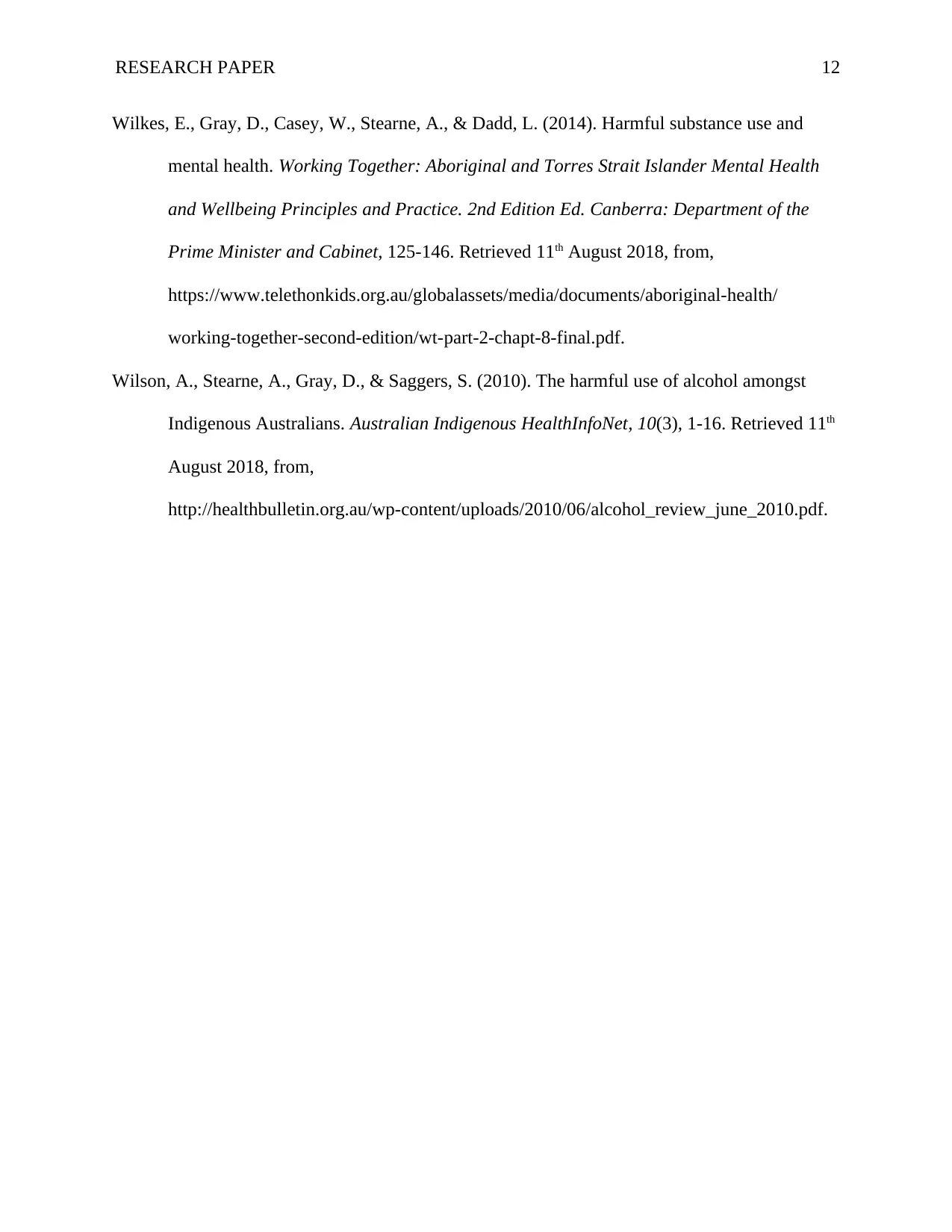
RESEARCH PAPER 12
Wilkes, E., Gray, D., Casey, W., Stearne, A., & Dadd, L. (2014). Harmful substance use and
mental health. Working Together: Aboriginal and Torres Strait Islander Mental Health
and Wellbeing Principles and Practice. 2nd Edition Ed. Canberra: Department of the
Prime Minister and Cabinet, 125-146. Retrieved 11th August 2018, from,
https://www.telethonkids.org.au/globalassets/media/documents/aboriginal-health/
working-together-second-edition/wt-part-2-chapt-8-final.pdf.
Wilson, A., Stearne, A., Gray, D., & Saggers, S. (2010). The harmful use of alcohol amongst
Indigenous Australians. Australian Indigenous HealthInfoNet, 10(3), 1-16. Retrieved 11th
August 2018, from,
http://healthbulletin.org.au/wp-content/uploads/2010/06/alcohol_review_june_2010.pdf.
Wilkes, E., Gray, D., Casey, W., Stearne, A., & Dadd, L. (2014). Harmful substance use and
mental health. Working Together: Aboriginal and Torres Strait Islander Mental Health
and Wellbeing Principles and Practice. 2nd Edition Ed. Canberra: Department of the
Prime Minister and Cabinet, 125-146. Retrieved 11th August 2018, from,
https://www.telethonkids.org.au/globalassets/media/documents/aboriginal-health/
working-together-second-edition/wt-part-2-chapt-8-final.pdf.
Wilson, A., Stearne, A., Gray, D., & Saggers, S. (2010). The harmful use of alcohol amongst
Indigenous Australians. Australian Indigenous HealthInfoNet, 10(3), 1-16. Retrieved 11th
August 2018, from,
http://healthbulletin.org.au/wp-content/uploads/2010/06/alcohol_review_june_2010.pdf.
⊘ This is a preview!⊘
Do you want full access?
Subscribe today to unlock all pages.

Trusted by 1+ million students worldwide
1 out of 12
Related Documents
Your All-in-One AI-Powered Toolkit for Academic Success.
+13062052269
info@desklib.com
Available 24*7 on WhatsApp / Email
![[object Object]](/_next/static/media/star-bottom.7253800d.svg)
Unlock your academic potential
Copyright © 2020–2026 A2Z Services. All Rights Reserved. Developed and managed by ZUCOL.





